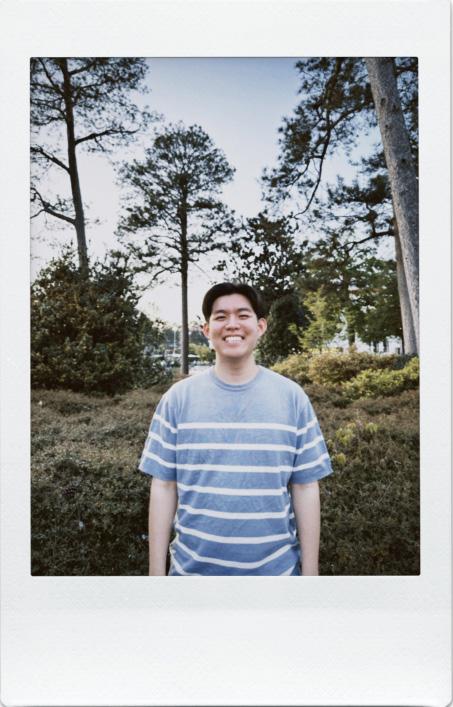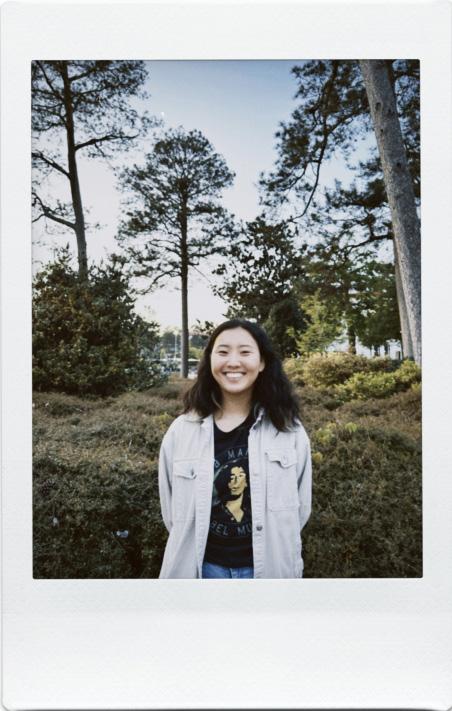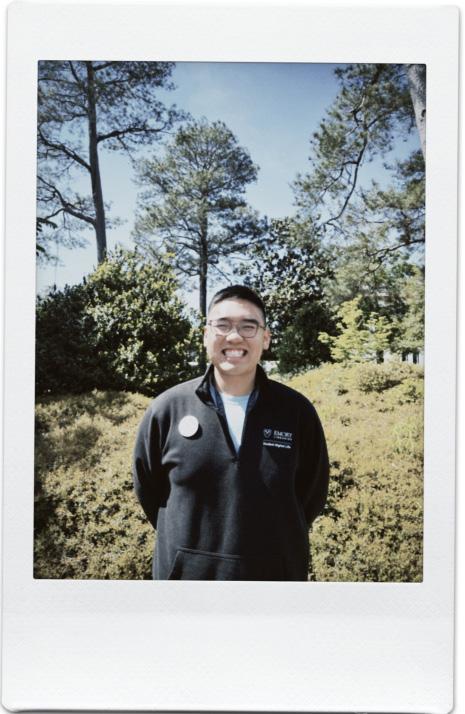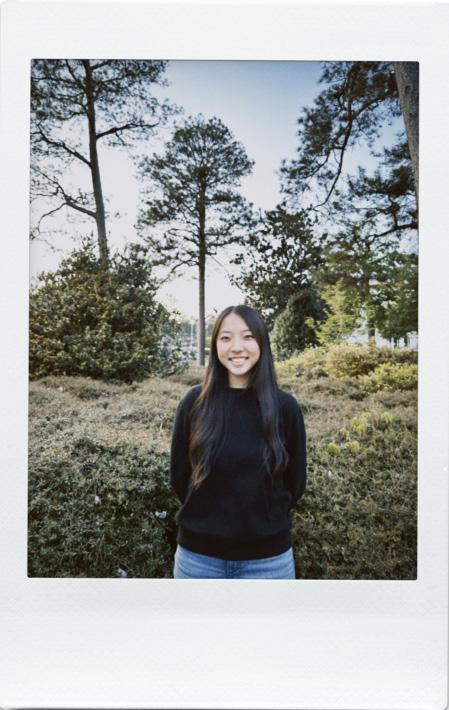
7 minute read
Senior Farewells
from I AM l Vol. 3 No. 2
by Emory In Via
Coming into college, I thought that I had planned not only the next four years, but even the rest of my life to perfection: I would study computer science, go to graduate school, work in the software industry, and comfortably live the rest of my life back home in Boston. I never once thought that anything could deter me from the path I had set out for myself, as it was the most “rational” course of action for my life.
Throughout the first semester I had spent at Emory, I was the happiest I had ever been: I was performing well academically, found a second family in the campus fellowship I had joined, and pursued my hobbies. After spring break of my second semester, all of it was taken away in an instant as the COVID pandemic swept over the world, and the rest of the year was spent isolated at home. Over the first few months alone, I grew bitter and angry towards God. Although I knew that He had intentionally brought me to Emory, I didn’t understand why He would separate me from it so quickly.
Advertisement
Although the pandemic took away many things, it gave me something I didn’t know I needed: time. In the midst of complete isolation and uncertainty, I had no choice but to sit with my thoughts and reflect instead of looking ahead, and it was during this season that I recognized the extent to which I was living according to my will and not His. God showed me that the plans that I had deemed “perfect” were simply a reflection of my lack of trust that He could do better. During this time, God engraved Proverbs 3:5-6 into my heart: He called me to rely on His wisdom instead of my own, to let go of my imperfect plans so that His perfect plan may unfold, and to acknowledge Him as Lord over the life that He graciously gave me.
These verses defined the rest of my college experience. Although I naturally seek control and certainty in almost every aspect of my life, I learned to give up control to God and place my hope in the certainty of His goodness. God then guided me out of a career that brought me false security, allowing me to pursue more fruitfully another that I had been too afraid to begin. He showed me the weakness of my rational mind, bringing me to humbly ask for the faith I lacked. Finally, He loved and served me when I didn’t deserve it, leading me to love and serve others even when I felt like I couldn’t. Through each of these processes, I witnessed God’s goodness and sovereignty as He straightened the paths that I had made crooked.
As I enter the next chapter of my life, there is still much that is uncertain, and paths that I cannot foresee. However, I trust that God has a better plan for me than I could ever imagine, and though there will be hardship along the way, I know who is with me at every step, and who waits for me at the end.
Proverbs 3:5-6
Trust in the Lord with all your heart, and do not lean on your own understanding. In all your ways acknowledge him, and he will make straight your paths.
Our generation has endured too many tragedies. In college, we faced the pandemic, the Atlanta Spa Shooting among other acts of racial violence against people who look like me, school shootings, and protests for racial and social justice in reaction to instances of police brutality. These cruel moments led me to wonder if there is hope in this world we inherited. As I wrestled with this question, I found myself returning to Ecclesiastes. In it, the writer discusses the ways that although life can be difficult and injustice exists, at the end of the book, the narrator writes, “Now all has been heard; here is the conclusion of the matter: Fear God and keep his commandments, for this is the duty of all mankind. For God will bring every deed into judgment, including every hidden thing, whether it is good or evil” (Ecclesiastes 12:13-14 NIV). The main point of the book is that hope is found in keeping His commands and seeking wisdom from God, for in the end, all things will come to be judged by Him.
While this temporarily comforted me amid the tragedies, I still wondered what the commands are, so I turned to the gospels. There, Jesus declared that the greatest commandment is to “love the Lord your God with all your heart, and with all your soul, and with all your mind and with all your strength” (Mark 12:30 NIV). Understanding and recognizing His greatest commandment, I was able to restore my hope for humanity.
For me, loving God with my heart meant that I would continue to trust that God is still sovereign over this world, even despite the rampant sin that is present in our society. Loving God with my soul means praying to him daily and asking him to transform me from the inside out so I can embody the fruits of the spirit. Loving God with my mind meant that I needed to see the hope in history and now despite the racism and heteropatriarchy that are infused in so many structures in our society, and as I wrestled with difficult questions through my research. And finally, loving God with my strength meant that I at times needed to surrender to God when life felt difficult; His strength is always stronger than mine.
If I learned anything from college, it’s that despite the tragedies and despair in the world, God is present and is moving. I reinterpreted purpose in life to mean keeping his commands, which meant loving him with my heart, soul, mind, and strength. By reclaiming hope in Jesus regardless of our world condition, I was able to discover that glorifying and worshipping God is a holistic surrender to the One.

“How Are You?”
One of the first things that I learned when I first moved to Emory from Indonesia was that when someone asks “How are you?” more often than not, it’s just part of saying hello. As an international student, I found it really tough in the beginning of college to adjust to the rhythms of living here. Whether that was greeting someone, making friends, or just surviving, it took me a long time to feel comfortable here. Long story short, I finally settled in and felt comfortable the summer after sophomore year. I reflected a lot about what exactly had changed to allow that to happen for me, and it finally hit me once I heard a testimony which was referencing John 1:43-51. The testimony emphasized the manner in which Jesus invited Nathaniel and Philip to become His disciples, how in inviting them, Jesus had taken care to ensure that they were seen, known, and loved. And, in the same way that Jesus had invited Nathaniel and Philip, He was reaching out to us too. He sees us, knows us, and loves us!

I think that sums up how I learned to love, and be loved in college. Back in my freshman year, being the only Indonesian undergrad at Emory, it was so easy to feel that nobody could ever really understand the struggles I was facing with the transition to college. Yet that whole time, I realize now, with the benefit of hindsight, that God was always working. Whether through a chance badminton game or a totally random meal, God had introduced me to so many people who ultimately led me towards seeing Him working in my life. Through all these people, He has reminded me that He is faithful to us even when we don’t see it – that we cannot let our anxieties about the present or future overcome our knowledge of how He is faithful and how He loves us.
For those of you who enter times where it feels like you are not visible, that you are not known or sought after, or that you are not loved, I just want to encourage you all! It takes time to develop roots here at Emory, and in that time it takes to feel rooted, God is always working, laying the path ahead of us. I remind myself of this too, as I go into another season of change– that God is working in all things, even through someone asking, “How are you?”
When I first entered college, my perception of God was narrow-minded. I viewed God as a critical and distant figure who scorned my imperfections. I struggled to connect with Him – how could someone so unworthy and flawed like me be his child? Nothing I had to offer seemed of value.

This insecurity followed me throughout college, especially being surrounded by individuals who excelled in their interests and passions. Despite my artistic abilities, I felt they were meaningless as I was not pursuing a career related to art. I could not see how this ability could glorify God, and I questioned why He hadn’t given me more useful skills such as writing or singing.
Through In Via, I met people who celebrated God’s beauty and expressed it through their creations. Initially, it was intimidating to be surrounded by such talented and intellectual people. But I believe God placed me into this organization to reveal to me that my talents and works can be used to display His glory and power.
Creating artworks for the journals in the latter half of college gave me a glimpse into the meticulous care and infinite intricacy of God’s design. Through His grace, my view of creation changed from a worthless endeavor to one that is so intimately tied to my faith, inspiring me to seek God and remember His goodness. As I yearn to emulate God’s way of creating, I can feel my curiosity to understand how He works fuel my desire to know Him more deeply through His Word.
Despite the continuing imperfections in my life, God is perfect, constant, and guiding. Even when I feel overwhelmed by the pressure to be perfect and impactful, I am reassured that God is perfect, and that He provides in my weakness. My imperfections and flawed intentions cannot overcome His will.
I hope you can find comfort in knowing that God has you. No matter how insecure you feel or how much you fail, God has already prevailed and wants you, not what you can give Him. The aim of all our creative endeavors is to know Him. Even our imperfect creations are still beautiful because they point to our need for Christ.
Philippians 3:12
Not that I have already obtained this or am already perfect, but I press on to make it my own, because Christ Jesus has made me his own.










